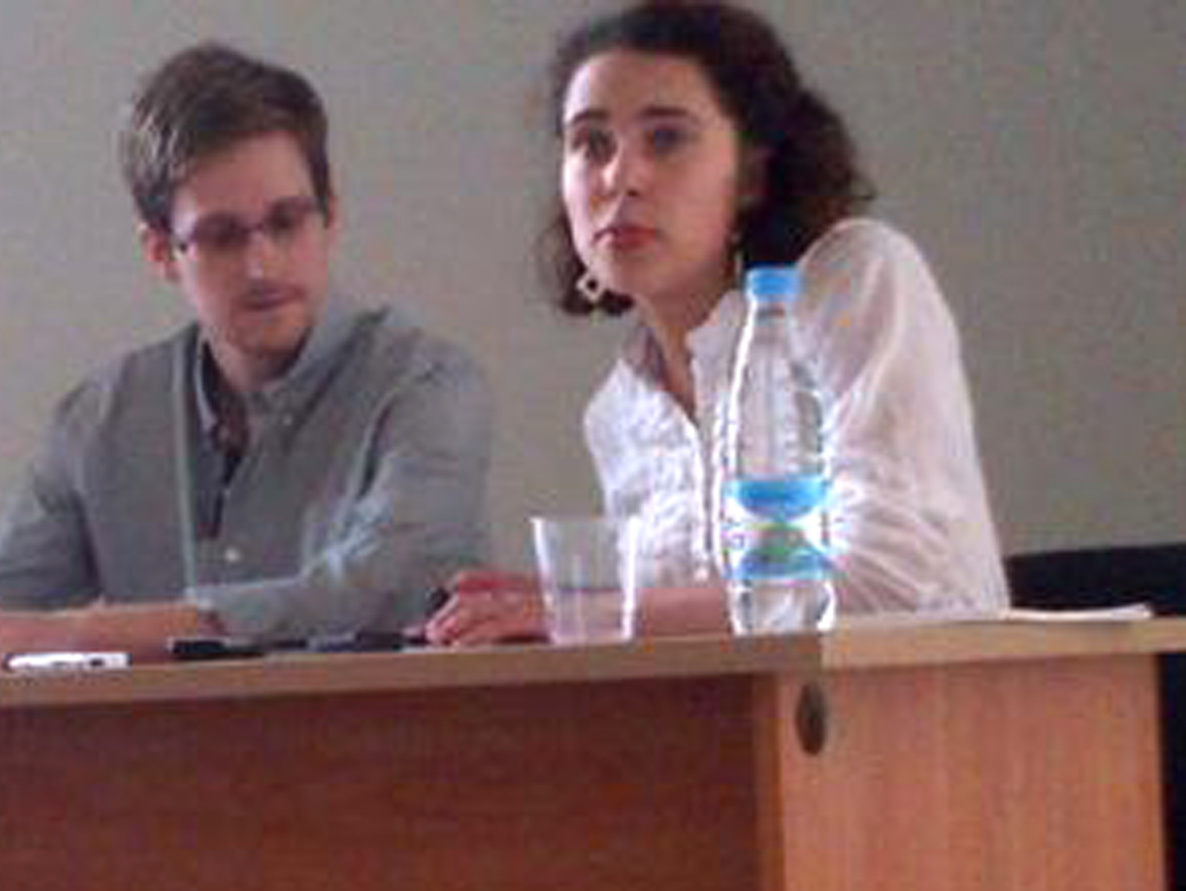
In Germany, a peculiar community is forming. Brought together out of concern of retaliation from their home nations, this group — whose only connection is that they all helped National Security Agency whistleblower Edward Snowden disclose state secrets concerning the covert electronic surveillance he stole while working for Booz Allen Hamilton — has grown to be a symbol of the opposition to government interference of watchdog journalism.
The newest member of this group, Sarah Harrison, who has been working with and accompanying Snowden since his arrival in Russia, has indicated that she is “in effective exile,” as her attorneys have instructed her it is not safe to return to the UK.
In a statement published on WikiLeaks, Harrison said that the interpretation of the UK Terrorism Act makes publishing any story on the bulk spying programs of the NSA, or the UK equivalent GCHQ, a potential act of terrorism. She goes on to lament that journalism that covers national security issues can be categorized as terrorism.
“The job of the press is to speak truth to power. And yet for doing our job we are persecuted,” Harrison wrote. “I say that these aggressive and illegal tactics to silence us – inventing arbitrary legal interpretations, over-zealous charges and disproportionate sentences – must not be permitted to succeed. I stand in solidarity with all those intimidated and persecuted for bringing the truth to the public.”
A strange choice
Harrison, a section editor for WikiLeaks, has been instrumental in the negotiations of Snowden’s extradition. A member of WikiLeaks Legal Defense team, though not a lawyer, she worked extensively with WikiLeaks Editor-In-Chief Julian Assange, particularly after the Afghan War document leak, which resulted in the publication of more than 90,000 “secret” classified military-log documents. She was instrumental in Assange’s Swedish extradition fight and currently serves as his closest adviser.
Harrison seems to be a strange choice to aid Snowden, as WikiLeaks has actual attorneys on staff who would have been better situated to assist, such as human rights lawyer Jennifer Robinson. In addition, the idea that WikiLeaks would send an escort to Snowden violates the organization’s previously established modus operandi to keep sources at arm’s distance.
While it is not clear how or why Harrison found herself in Berlin, she believes she is not free to return home. In August, David Miranda — the partner of journalist Glenn Greenwald, who broke the Snowden story — was detained and questioned for nine hours, the maximum amount of time permitted without a formal charge, at London’s Heathrow Airport under the Terrorist Act, with his cellular phone, laptop and computer equipment seized. While it is unclear if Miranda is directly involved in the Snowden case, he did visit Laura Poitras — an American filmmaker and another “Snowden’s exile,” who has been working with Greenwald and the Guardian on the Snowden files. The Guardian paid for Miranda’s flight.
“David’s detention was unlawful and inexcusable. He was detained under a law that violates any principle of fairness and his detention shows how the law can be abused for petty, vindictive reasons,” said Widney Brown, Amnesty International’s senior director of international law and policy.
Brown believes that, considering the length of the interrogation, and the fact that his property was seized, the detention, despite the government’s assertions, was not random or incidental. Such detentions — made under Schedule 7 of the Terrorist Act — deny the detainee access to legal counsel and make it a criminal offense to not cooperate with the questioning.
“There is simply no basis for believing that David Michael Miranda presents any threat whatsoever to the UK government. The only possible intent behind this detention was to harass him and his partner, Guardian journalist Glenn Greenwald, for his role in analysing the data released by Edward Snowden.”
On Nov. 12, Reporters Without Borders called on England to promise the safety of Harrison. According to the 2011 General Comment No. 34 to the International Covenant on Civil and Political Rights, freedom of expression is necessary for the realization of the principles of transparency and accountability, which are essential for the protection of human rights.
“David Miranda’s detention at Heathrow Airport in August under the Terrorism Act and the nine-hour interrogation that ensued have given us an idea of the welcome that could await Sarah Harrison in Britain.” Reporters Without Borders said. “The British authorities must give assurances to Harrison that she can return to her country safely if she wishes. The Terrorism Act and defence of national security must not be used as grounds for harassing journalists who investigate sensitive subjects.”
Snowden’s exiles
The community of “Snowden’s exiles,” when looked at objectively, is a study in contrasts. Julian Assange, a former computer hacker who has been credited with starting one of Australia’s first public Internet Service Providers and was a noted author of freeware, or free-to-use software, is currently under de facto house arrest at the Ecuadorian Embassy in London, dodging an extradition order to Sweden to face multiple counts of sexual assault.
Glenn Greenwald, a well-received civil rights lawyer and award-winning journalist, is currently on watchlists in the United States, England and in a number of allied nations.
Laura Poitras, a 2012 MacArthur Fellow, is the only person — beside Greenwald and Snowden — that has the complete archive of the NSA mass surveillance disclosures. As such, she is regularly stopped and detained when entering or leaving the United States and has — at least once — been threatened with denial of re-entry. After the release of her film “My Country, My Country” in 2012 — which presents a stinging rebuke of the American occupation in Iraq — she was advised that she is on the Department of Homeland Security’s watchlist and has been assigned the highest-possible threat level. Poitras is currently in Berlin.
Jacob Appelbaum is a core member of the Tor project and has collaborated with Assange. Appelbaum is responsible for several high-level computer hacks, including the breaking of Apple’s FileVault security. Appelbaum is also in Berlin after more than a dozen detentions with the U.S. border patrol and a 2010 court order that forced Twitter to release account data associated with Appelbaum to the Justice Department.
These are but just a few of those who are or have been targeted — including Chelsea Manning, who is now facing 35 years in prison for the release of 250,000 American diplomatic cables to WikiLeaks, and Barrett Brown, who is facing 17 computer-crime charges in regards to leaking information while involved with Anonymous.
It is worth mentioning that Germany is currently the hub of the world’s condemnation toward the United States over its seemingly extralegal surveillance. Outrage over the NSA’s collection of metadata from millions of German communiques, and the allegation of German Chancellor Angela Merkel’s cell phone being hacked have severely damaged German trust in the United States and willingness to accept excuses. It was the German newsmagazine Der Spiegel that — along with the Guardian — repeatedly broke the stories of American eavesdropping.
“The problem is she’s now part of this net of suspicion,” said Jeremie Zimmermann, the spokesman and co-founder of the digital rights group La Quadrature du Net in France, on the prospects of Harrison ever returning home. “It is likely that she would be suspected of the same kind of nonsensical charges if she even stepped foot [in London]. So in a way, until further notice, she might be constrained to exile, the same way that Snowden, Greenwald, Poitras, [and] Appelbaum are today.”
From her statement, it seems likely Harrison has no regrets and accepts her exile as part of a cause worth fighting for.
“When whistleblowers come forward we need to fight for them, so others will be encouraged, Harrison wrote. “When they are gagged, we must be their voice. When they are hunted, we must be their shield. When they are locked away, we must free them. Giving us the truth is not a crime. This is our data, our information, our history. We must fight to own it.”


